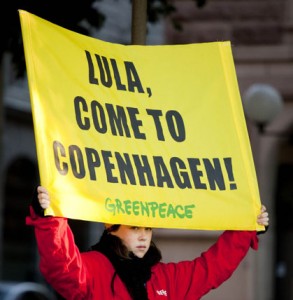
Photo from Global Warming.Change.org
President Lula made his case for greenhouse gas emissions reductions at the UNFCCC fifteenth Conference of the Parties (COP15) at Copenhagen. In an open letter published in the Christian Science Monitor, Lula admonished,
“It is beyond doubt that both the benefits of economic development as well as the costs of environmental degradation over the past decades have been unevenly distributed both among and within countries. While some profited and continue to profit from the irrational exploitation of natural resources and unsustainable levels of consumption, the vast majority of the world’s population has little to show for it.”
In a speech to the COP15 plenary today Lula argued that
“Developed countries must put their money on the table because of the greenhouse gases they have emitted for two centuries, allowing them to industrialize before the developing world. The COP15 should not be negotiations between the haves and have nots… rather these negotiations are about constructing sustainable opportunities for everyone around the world.”
Walking the talk, Lula and Brazil pledged to finance a global fund for emissions mitigation and global warming adaptation for poorer countries if the developed world committed to steep emissions reductions and generous contributions to the fund.
Interestingly, Greenpeace Brasil, no friend to the Brazilian president, commented that
“Lula did what was expected of him, in the absence of major decisions, in a plenary full of beautiful words and good intentions. Obama, who followed Lula, threw a cold pail of water on the proceedings. Yes, he made a beautiful speech, although absent of any engaging proposals. He demanded that others, especially China, make concessions, but he was unable to commit the U.S. to greater reductions. He asked the world to stop dividing the world into developed and developing countries, but closed his eyes to the poor, including Africans, land of his father and where his grandmother lives, who will suffer disproportionally more from global warming”
Lula did meet behind closed doors with the U.S., China, and India to steer the COP15 toward a constructive close, but his efforts to engineer a breakthrough, in large measure inspired by Brazil’s recent efforts to combat global warming and make significant contributions to a global fund to finance similar efforts in the poorest countries, seem to by stymied by the Republicans in the U.S. Senate, the Chinese Communist Party, and the Indians’ energy security challenges.
During Lula’s first term (2003-2007) it would have been difficult to imagine that he could have arrived at Copenhagen as the most credible leader in the area of climate change policy, but it is clear that his participation at Copenhagen reflects a national commitment to breakthrough the global impasse and lead the way toward a new international regime that confronts global warming by fomenting sustainable, equitable development.
Yes, Lula has his critics in Brazil, including Greenpeace Brasil, but even this organization had to admit,
“Lula showed responsibility, vision, and commitment as he highlighted the incoherence of the U.S. positions expressed by Barack Obama who talked a lot, but failed to lead COP15 as the leader of the most powerful nation on earth.”
Clearly Lula’s remarks and his leadership reflect Brazilians’ growing concern over the environment and willingness to pay the costs of the nation’s global leadership on the issue. In sharp contrast, the U.S. President’s speech reflected the particular, even perverse interests represented by Senate Republicans and coal state Democrats who have played an instrumental role in spoiling international efforts to make polluters pay. Lula and Brazil will certainly come away from Copenhagen frustrated, as the President admitted in his speech to the plenary today, but also increasingly confident in their growing leadership and vision, key traits lacking among the political leaders of China and the United States.